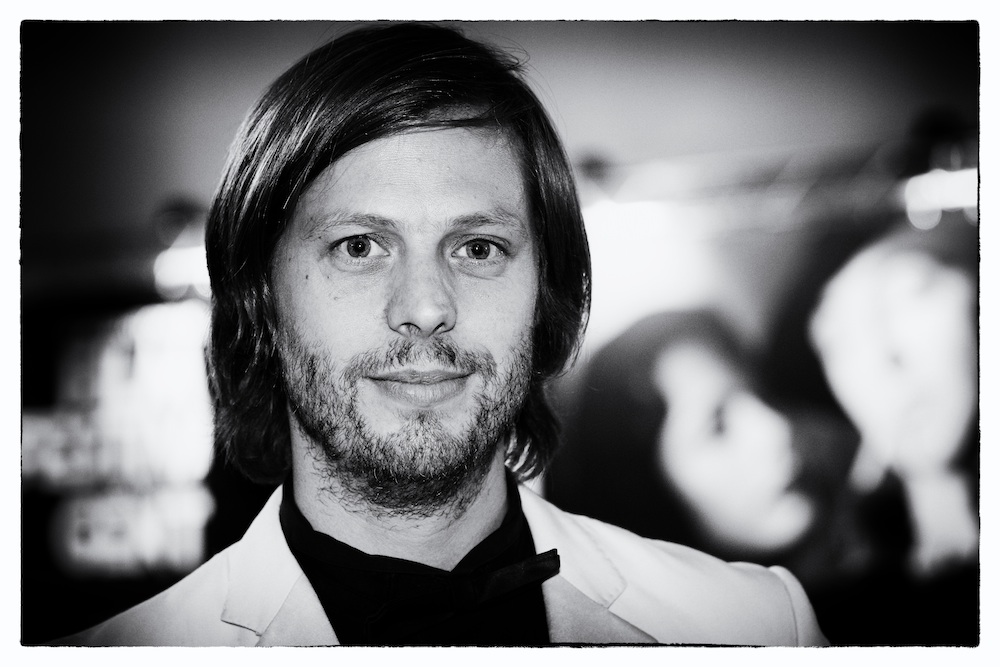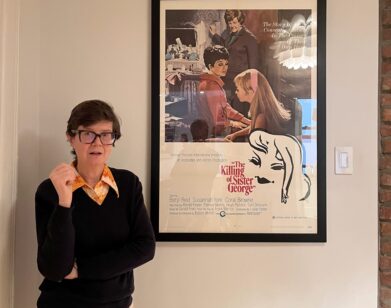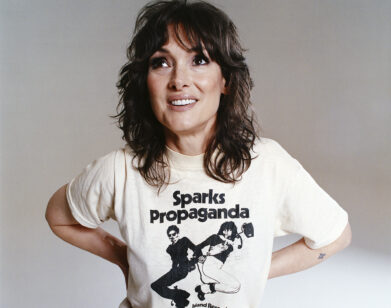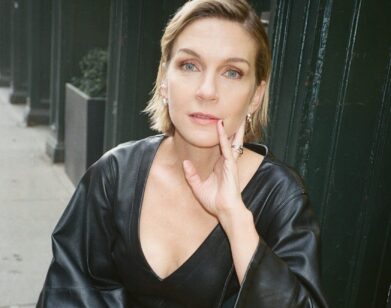Felix Van Groeningen’s Circle of Trust

ABOVE: FELIX VAN GROENINGEN. PHOTO COURTESY OF HANS DEGREVE
“You cannot share grief,” says director Felix Van Groeningen. This heartbreaking maxim is at the center of Van Groeningen’s new film The Broken Circle Breakdown. A couple, Didier and Elise, are propelled into different spheres when their young daughter Maybelle is diagnosed with cancer. Neither one is able to comfort the other, and as they become more isolated in their distress, they begin to self-destruct. Augmenting their anguish is the soundtrack: Didier and Elise sing in a bluegrass band together. With its sparse strings and earnest, broken vocals, bluegrass quickly becomes the music of pain.
The Broken Circle Breakdown is Belgium’s official Oscar entry for Best Foreign Language Film and has already picked up numerous awards at Berlin and Tribeca. Johan Heldenbergh, who wrote the original play, stars as Didier opposite singer and actress Veerle Baetens as Elise. It is Heldenbergh and Van Groeningen’s third film together.
EMMA BROWN: Your film is beautiful, but very upsetting.
FELIX VAN GROENINGEN: [laughs] I’m sorry.
BROWN: I think the moment that pushed me over the edge was when Maybelle’s gums are bleeding, and Elise tells her not to brush her teeth so hard. Was there a specific moment that really got to you when you first saw the play?
VAN GROENINGEN: It did, but it was a lot further in the story. It was the moment of the Jesus rant, where you see this guy who’s so passionate and so angry. He says things that make sense, but it comes out all wrong. You understand why—you understand perfectly—because of what has happened to his little girl. But, in a way, it just makes no sense to have somebody saying those things in the way he does. That was what really, really, really struck me very deep. That, as a specific moment, I would say. The bigger thing is that you just see a couple who are just made for each other and you see them splitting ways. Just slowly, slowly, slowly. That, I found completely heartbreaking.
BROWN: Do you think their relationship could have been salvaged?
VAN GROENINGEN: Probably, but that’s not the story. The story is about the fact that you cannot share grief, so we had to tell it this way. What we tried in screenwriting was for them to try [to resolve their problems], because they love each other so much that they will try. But then they have a different timing in dealing with grief.
BROWN: You’ve known Johan for a while. How did you first meet him?
VAN GROENINGEN: I first saw him during a theater play a long, long time ago. It must have been 20 years ago. He was this amazing actor who everybody loved and was so, so wild and yet so funny. I can still remember the first time I saw him on stage. I always adored him as an actor. He played in my first movie (Steve + Sky, 2004) and in my third movie (The Misfortunates, 2009) and then we became friends, I guess. That’s how I went to see his theater play and then I decided to make a movie.
BROWN: Did you become friends while you were making your first movie, or was it more gradual?
VAN GROENINGEN: Yeah, it’s a gradual process. I say we’re friends now, but it’s not that we call each other often. It’s usually through work that we will meet. There is real friendship there, too, but it’s not that we hang out all the time.
BROWN: When you decided that you wanted to turn the play into a film, was it difficult to ask Johan?
VAN GROENINGEN: No. I knew that he wanted this—that he was looking forward to it happening. So I wasn’t afraid to ask. The first thing I asked him was, “Can I make it into a movie, and are you okay with it that you don’t collaborate on the screenplay?” And he was completely fine with that. He had the same idea, he was like, “No, it’s better if I don’t and you have complete freedom.” And he’s been amazing in giving me that freedom. I’ve adapted before and after, I’m doing an adaptation right now, and the writers of the original, they’re usually difficult people because they know why they did that and this and if you’re going to change things, they’ll always be a bit stingy about it. [laughs] They understand why you have to do it, but still they want you to stick to the original. Johan was always extremely supportive about this. Like, “Yeah, great idea. Too bad I didn’t come up with this one.” I couldn’t imagine it myself—if you write the original you could say, “Okay, just do whatever you want, I don’t want to know about it.” But he was forced to collaborate [as an actor] and he did and [was] always constructive, always positive.
BROWN: Did you ever have convince him that a change was for the best?
VAN GROENINGEN: Well, I took two incredibly big decisions: I didn’t choose the original actress from the theater play, and I chose different musicians. So those were not easy decisions for me to make… But did I have to sell him? I don’t know, I just told him about it and he understood it. He wasn’t happy about it, but he gave me the freedom and his trust. He knew I loved his play and he also played in [my previous film] The Misfortunates and it was one of his most favorite Belgium films ever. So he really trusted me in bringing this to a good end.
BROWN: I actually can’t imagine the film as a play. It seems very cinematic in the way that it’s constructed. Did it have the same structure on stage?
VAN GROENINGEN: In a way it did. When I first saw the play, 20 minutes in I was already crying—I felt where it was going to and then it didn’t let go of me and I just kept crying the whole way through. But it was completely different. It was very simple: a bluegrass band onstage, all dressed in white, and two singers—a female and a male—[who] started telling their story to the audience. So they didn’t really enact any of the scenes, there wasn’t a little girl, they just told their story. But when you tell the story, you also go back and forth in time because you remember a moment and then you go back to the end, so in that way it worked like the movie works. But as you didn’t see those things, it worked completely different.
BROWN: You’ve said that, although Johan played the role 200 times onstage, he found another facet of his character while making the movie.
VAN GROENINGEN: The state of his character in the play is how you see him in the end: he was raging the whole time. And through this raging, or in between those rants that he had onstage, you understood how he became that way. But in the movie, we really had to show how he changed. You see a great, passionate guy turning very sour and frustrated and angry. So he kind of did the reverse during rehearsals. Like, “Hey, what if Didier would be really, really warm here—even warmer.” Then you see his first change, but what makes him change? Discovering those moments was very, interesting. It was very fascinating for both of us, discovering that.
BROWN: Do you think about where Didier ends up after the film ends?
VAN GROENINGEN: For me, the last scene says it all. He keeps on playing music. A lot has gone for him, but he still has his music and you people will always go on. That’s why I think it’s a positive story.
BROWN: Do you remember the first movie that made you cry?
VAN GROENINGEN: E.T., probably. [laughs] But really, really, really cry? I think the saddest movie I have seen to now is Talk to Her, Almodóvar.
BROWN: Is there any contention over whether Belgium chooses a film in French or in Flemish to submit to the Oscars?
VAN GROENINGEN: Apparently there used to be, but that was all unofficial. This year, there was a big back and forth and we had to really defend it. There was even an American commission that gave advice on which film they consider best. The idea is to send the film with the best possibilities or the biggest chance, which makes sense. And I think that’s a good thing. It’s not always in every country that way. Some countries send really strange choices. I mean, maybe good films but maybe not the right film to send to the Oscars.
THE BROKEN CIRCLE BREAKDOWN OPENS IN LIMITED RELEASE TODAY, NOVEMBER 1.






